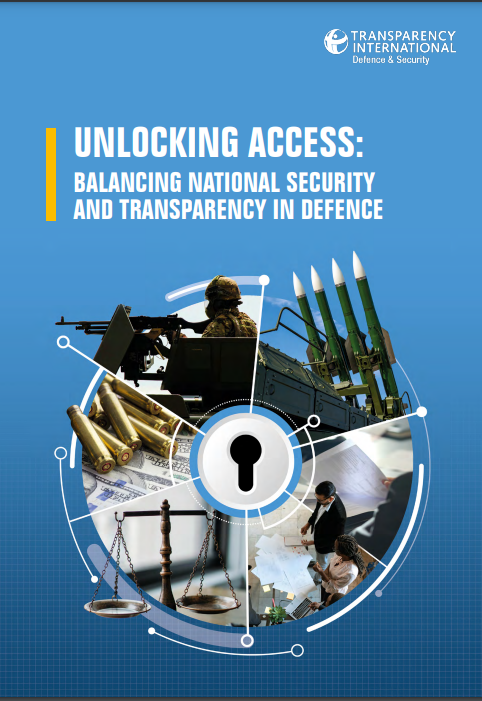
New research conducted by Transparency International Defence & Security (TI-DS) underscores the need for better access to information in the defence sector to curb corruption, ensure accountability, and improve civic engagement.
Published today by TI-DS the booklet, Unlocking Access: Balancing National Security and Transparency in Defence shines a light on opaque defence sectors worldwide at a time of increased geopolitical tensions and global military spending reaching record highs of $2.4 trillion.
The report highlights challenges and good practices of transparency in defence budgets, procurement and policy processes using detailed case studies from Armenia, Guatemala, Malaysia, Niger, and Tunisia. The countries are at varying stages of progress in advancing access to information in their defence sectors and face a range of challenges, including conflict-driven secrecy, democratic backsliding, and stalled reforms.
The analysis reveals that while international frameworks provide guidelines for transparency, implementation remains weak. Blanket national security exemptions are often used to justify withholding critical information, while public interest tests designed to balance the benefits of disclosing against the potential harm are mostly absent.
This lack of transparency increases the risk of corruption, mismanagement of funds, and fuels public distrust of the very institutions tasked with protecting citizens.
For Malaysia, governance reforms – including access to information - have stalled, with the Official Secrets Act 1972 (OSA) severely limiting access to information. The OSA functions as the de facto national framework for preventing access to information and overrules any other legislation on information access. There is little knowledge about the details of our defence budget or expenditures, and almost no publicly available information about acquisition planning. TI-Malaysia calls upon the government to accelerate the tabling of the Freedom of Information Bill and at the same time amending the OSA 1972 to moderate a better balance of transparency versus secrecy for the sake of national interest only where it is justified.
This report offers specific recommendations for each of these five countries to improve access information which broadly fit into these categories:
- Balancing tests: Legal frameworks should require officials to assess the public interest versus potential harm before withholding
- Proactive disclosure: Governments should regularly and proactively publish defence budgets, procurement plans, and financial results to enhance
- Independent oversight: Review bodies should be established to monitor and adjudicate disputes over information access.
- Civil society engagement: Defence planning and policymaking should be open to civil society for broader input and oversight.
Secrecy due to national defense and security concerns should never be allowed to be exploited as a means to hide corruption and bad management of public funds.
-End-
Notes to editors:
The case studies in Unlocking Access were produced using an updated version of our Government Defence Integrity Index 2020 – the leading global assessment of the governance of and corruption risks in defence sectors. The data was supplemented by interviews with local experts, and the review of policy reports and media investigations. Unlocking Access: Balancing National Security and Transparency in Defence - Transparency International Defence & Security
For clarification on any and all official statements from Transparency International – Malaysia (TI-M), kindly refer to its President, Dr Muhammad Mohan (mmohan@transparency.org.my)







